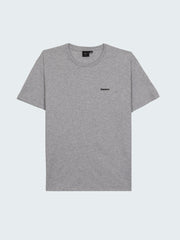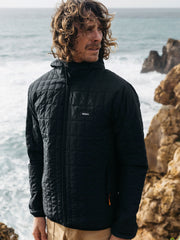The Right To Roam: In Our Nature
11.23.20
4 min read
When did you first discover your connection to the sea, and how did it come about?
LUCY
I feel like I can’t remember the specific moment or event that brought me close to the sea. I’ve always felt like it’s something that I wanted to be in and be close to. I used to bodyboard and swim and I was always that person who doesn’t feel the cold, so I would spend all day in it whenever I could. It was a really personally driven experience for me. Then, when I was a bit older, my mum got a new partner – my stepdad. He’s a real ocean soul. He’s not a surfer, but he used to catch salmon with his hands from the rivers and he really loves the sea. He would teach me things about the ocean and make me feel confident to go deeper, to go out in bigger waves, to go further – telling me the wonders that you could find out there.
He would take me and my mum to this amazing camping spot, right on the cliff in north wales, and we would see dolphins. I always say, the first time I saw dolphins was such a watershed moment for me in terms of the ocean and planet conservation. I just remember feeling how precious and intelligent these creatures were and wanted to learn more about the ocean and do what I could to protect it.
JOYA
I grew up in Dorset, really close to the beach. We were on the Jurassic coast, so we would always go walking with the dogs as a whole family, wrapped up in the winter in huge coats. We would go fossil hunting, and swimming, and in the summer we would spend all day, every day, before and after school, on this beach, butt naked, with our school uniform just abandoned somewhere on the beach. We’d cover ourselves in clay, get in the water and generally refuse to go home.
So I think that’s really the place where I found my connection with the ocean. Seeing that horizon every single day, where the water and the sky meet. For some people, that’s a really terrifying place – they can’t deal with the infiniteness of it – but for me it makes me feel calm because I feel endless opportunity.
What does the sea provide you with in your lives, both personally and professionally?
JOYA
The ocean has this magical way of mirroring what you are feeling back at you. For example the open horizon can make people feel different. Some people are terrified of its infiniteness, others find peace and perspective in it. Only recently being in London for this second lockdown have I fully come to realise how much the ocean means to me. I dream every day of what It feels, smells, and looks like.
It balances, energises and inspires me. I was going to say it restores me, but there’s something about the movement of the water and the openness of it that is equally grounding and energising. And I say it inspires me because it’s inspired us to tell these stories. It’s led us to the other side of the world to tell stories! And being slapped in the face by a cold wintery Atlantic wave, has to be one of the best feelings in the world.
LUCY
For me, I’m wholeheartedly addicted to surfing. Even when there’s no surf I still want to be in or around the ocean, whether it’s swimming, storm watching, spotting seals, snorkelling… The sea is everything for me. It changes every day, every hour, every minute. And so do we – our emotions, our energy levels, our perspectives. So it can be any of those things. I think it teaches you, and is a constant reminder, that the elements are so much greater than us.
The stories you choose to tell in your films often focus on underrepresented characters or narratives – with a focus on intersectional environmentalism. Do you feel a duty as filmmakers to tell those stories? And how do you go about selecting/accepting projects?
LUCY
I think that maybe a couple of years ago, we would never have thought about it as a ‘duty’. It was just that we were highly motivated by that feeling of being so privileged to have this connection to nature and the ocean, and wanting to share that privilege with other people.
So, it started as a motivation and then more recently, we’ve been thinking about using film as part of much wider spanning impact campaigns to create change. So I’d say we’ve recognised that it is a duty that we have, because we have this skill, and we love doing it as a passion, but it’s also very powerful. And I don’t think either of us could live with ourselves if we didn’t do it or use it for what we knew it had the potential to achieve.
JOYA
I don’t know. I’ve never felt like it is a duty. But then, I’ve always felt a responsibility to tell relevant stories that are going to push the world forward. Telling positive climate stories is where we want to be. The culminating emotion that people should feel when a film ends is that they now know what actions they can take - reminding people of their power and agency in these conversations. So, solution based storytelling, hope, and impact campaigns with distinct calls to action are really critical – so that people can understand their agency, impact and how they can learn to tread lighter on this planet.
As filmmakers from the global north who were given the opportunity to pitch narratives to powerful platforms, we took that opportunity to use our privilege to push the environmental conversation forward. We started asking ourselves questions like, “Why are we not seeing women of colour in the surf industry? Why are we not seeing diverse voices in the climate crisis? Why are we not hearing from the people on the front lines of the climate crisis?” Because they’re out there! We’ve been to Colombia, spent time on an island, made a film with a community who could become ecological refugees at some point in the near future. So something we’re trying to work out now is, how can we use our privilege to somehow bring the stories from the front line forward so that these people are telling their own stories.
Why do you think film, and visual storytelling in general, has been so effective in raising public awareness of ocean plastic pollution? And do you think it still has that role, or are people becoming desensitised?
JOYA
For us, if these stories are coming from these people’s voices authentically, and they’re being shared among the Global North it should urge us to change our daily actions. We just need these communication pathways to be set up because at the moment it feels like it’s ‘over there’. Horrific floods, landslides, storms, cyclones, desertification – they’re not happening to the same degree here daily… yet.
When we are telling stories about almost invisible problems, for example micro plastic in the ocean, these are issues that, when you live in a city like London, you are not immediately around them. So telling these invisible narratives is vital.
LUCY
Yeah, I think the way one would summarise that is that it’s often those who contribute the least to climate change who are the most affected by it. And I think it’s vital that as a filmmaking community, as an industry that has so much influence, we do what we can to highlight and address that.
For sure, I think people are desensitised to what now is almost like stock imagery of plastic in the ocean, or deforestation. It’s still hurtful to see it, but unless it’s there with a story, I don’t think it reaches people enough to prompt them into action. I think that’s why we’re so inspired to tell human stories, because I think they’re really one of the most powerful ways to really get under someone’s skin and make them feel something. It'll stick with them more, and hopefully have more of an impact on their daily decisions.
So what’s next for you guys? Do you have any new projects on the horizon?
JOYA
I mean, there’s always something going on! But I think that maybe something along the lines of listening, and just finding ways to communicate and tell stories that aren’t just film-centric. But we’re also making a film called Eve so we’re doing our whole impact campaign around that. It’s quite exciting because for the making of the whole film our entire carbon impact was calculated. It’s going to be a case study of one of the first UK short documentaries that will be carbon calculated and offset.
LUCY
We even counted the emails! We had a sustainable production manager who was able to do all of that for us. So yeah, we went really deep to analyse it and it feels really exciting that we’re on this journey of looking at filmmaking in a different way, and how we can have conversations in the industry about sustainable filmmaking.





















































































